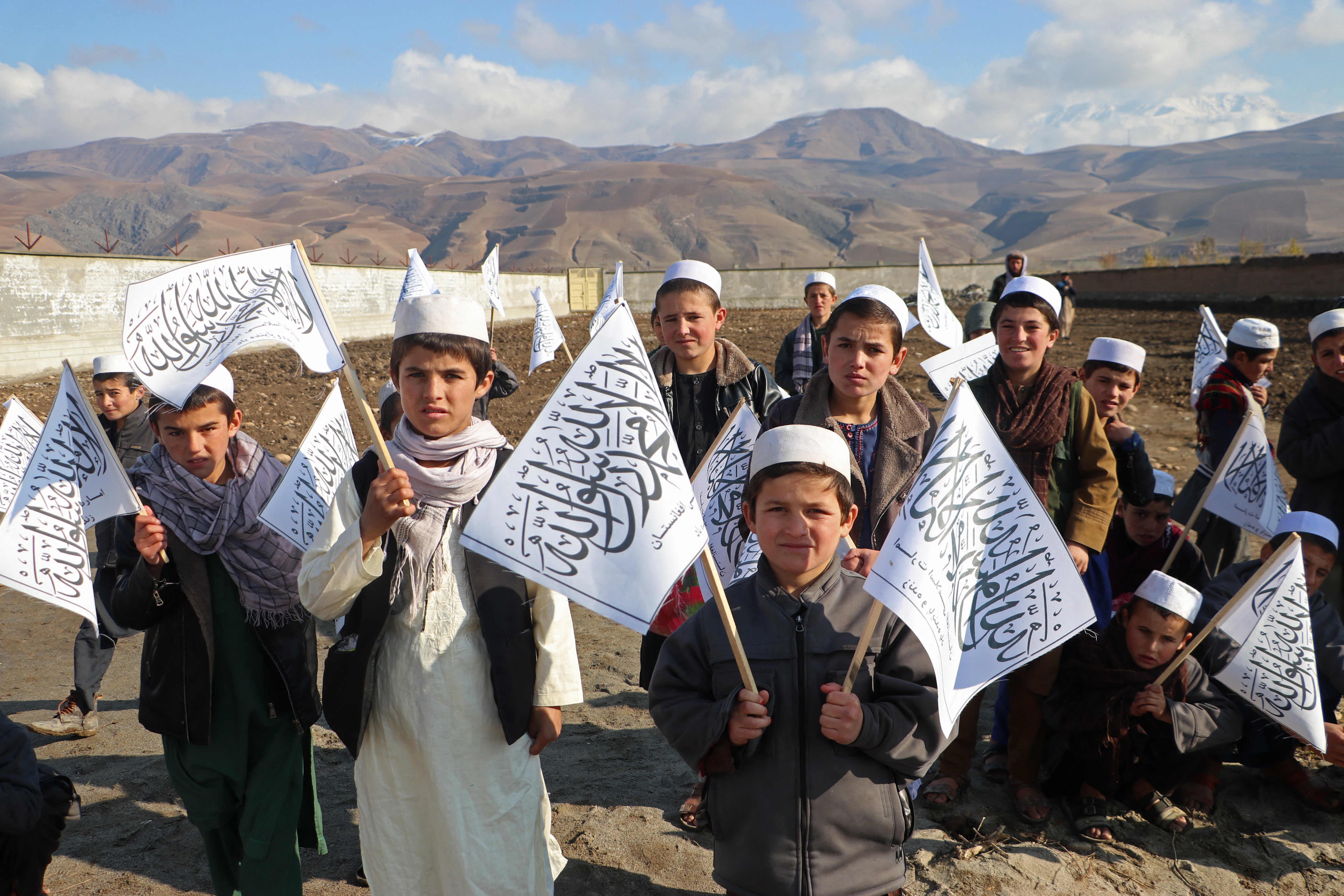UN special envoy calls for more direct engagement with Taliban regime in Afghanistan
‘Dialogue does not legitimise’, insists official reporting to UN Security Council

Afghan children from a Madrassa or an Islamic school hold Taliban’s flag in Fayzabad district of Badakhshan
The United Nations Security Council should have more “direct engagement” with the Taliban regime that has seized power in Kabul, according to the head of the UN mission there.
Roza Otunbayeva is the UN’s special envoy to Afghanistan and was giving a quarterly briefing about the situation in the country to the Security Council on Wednesday.
The UN has refused to recognise the Taliban, an Islamist militant group, as the legitimate government of Afghanistan since its fighters seized power by force in August 2021. The Taliban took control of Kabul by ousting a democratically elected government after the withdrawal of Western allied forces.
Since taking power, the Taliban regime has banned women from schools, workplaces and public recreational facilities, provoking international condemnation.
Ms Otunbayeva suggested the UN should take advantage of the group’s craving for international recognition by opening channels of communication, suggesting this was the only way towards achieving a “durable and more detailed consensus on Afghanistan”.
“Second, making far greater use of the de facto authorities’ willingness to engage in dialogue with members of the international community. Dialogue does not legitimise. It can be used to express disapproval yet encourage change,” she told the Security Council.
She added: “We have often spoken of the need to learn lessons from our engagement since August 2021. One lesson, I believe, is that there has simply not been enough of it. There must be more direct engagement with the de facto authorities, including in Kabul.”
Ms Otunbayeva said the United Nations is receiving “more and more anecdotal evidence” that girls are being permitted to study at religious schools in Afghanistan.
“We are receiving more and more anecdotal evidence that girls of all ages can study at madrassas. It is not entirely clear, however, what constitutes a madrassa, if there is a standardised curriculum that allows modern education subjects, and how many girls are able to study in madrassas,” she said in her briefing to the council.
The diplomat added that the Taliban ministry of education is “reportedly undertaking an assessment of these schools as well as a review of the public school curriculum”.
She added that the Taliban officials have said they are working on creating conditions to “allow” the return of girls to school.
“But time is passing while a generation of girls is falling behind. A failure to provide a sufficiently modern curriculum with equality of access for both girls and boys will make it impossible to implement the de facto authorities’ own agenda on economic self-sufficiency,” she said.
Afghanistan under the Taliban is the only country on the planet that has banned girls and women from attending secondary school and universities, a ban which has been in place for more than two years and is expected to have wide-reaching implications for the country’s society and economy if it persists.
Pro-democracy leaders of Afghanistan’s previous administrations have urged the world not to offer a platform for the Taliban and its sanctioned leaders on the global stage.
In an update about the human rights situation under the Taliban, Ms Otunbayeva said that the key features in Afghanistan “are a record of systemic discrimination against women and girls, repression of political dissent and free speech, a lack of meaningful representation of minorities, and ongoing instances of extrajudicial killing, arbitrary arrests and detentions, torture and ill-treatment.”
The lack of progress in resolving human rights issues is a key factor behind the current impasse between the Taliban and the international community, she said.
Humanitarian needs in Afghanistan have continued to push to new record levels, with “more than 29 million people requiring humanitarian assistance — one million more than in January, and a 340 per cent increase in the last five years,” said UN humanitarian coordinator Ramesh Rajasingham.
Since the fall of Kabul to the Taliban’s ultra fundamentalist rule, Afghanistan has been battling an economic collapse, drought, the aftermath of a major and deadly earthquake and now faces a winter where millions of children are at risk of acute hunger.
Subscribe to Independent Premium to bookmark this article
Want to bookmark your favourite articles and stories to read or reference later? Start your Independent Premium subscription today.

Join our commenting forum
Join thought-provoking conversations, follow other Independent readers and see their replies